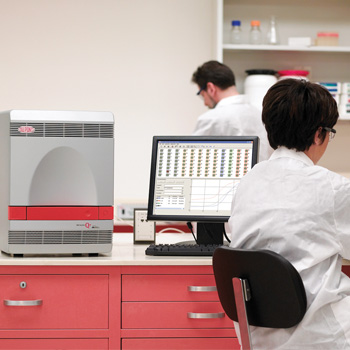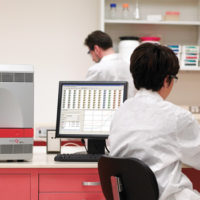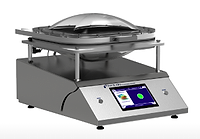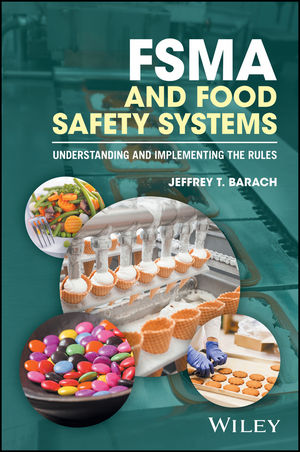Technology Rules. Results Matter.

Fast, accurate results are critical for delivering safer food products for consumers and more profitable growth for food companies. That’s why, at DuPont Qualicon, our food safety science is focused on continually developing state-of-the-art technologies that are faster and more accurate. In fact, for more than a decade, we have been revolutionizing food safety.
DuPont Qualicon was the first company to apply polymerase chain reaction (PCR) technology to food testing. Our use of automated PCR processing with tableted rather than liquid reagents created a dramatic increase in speed—helping to usher in a new era of easy-to-use testing methodology.
We were also the first to develop rapid, DNA-based assays for Salmonella, E. coli O157:H7 and Listeria monocytogenes. Our expertise
in DNA testing led to the first genetics-based assay for detecting yeast and mold in food within 48 hours—a significant improvement over traditional cultures that usually take up to five days to produce results.
Our unwavering focus on delivering increased speed and accuracy in food testing landed us on the R&D 100 Most Important Technological Developments list for two years in a row.
While we’re proud to have been a part of food safety history, we’re always looking ahead to provide the next cutting-edge solution. Our
scientists are committed to producing world-class technologies that can address the most pressing issues facing the food industry today.
Consider a few of our latest innovations:
• A PCR assay that detects yeast and mold in food—including shredded cheese and flour products—at customizable thresholds set by the user. The standard protocol, which detects yeast and mold in concentrations of 25 CFU/g or more within 48 hours, reduces product hold time by three days compared to traditional culture methods. Alternative protocols for ultra-sensitive detection of low concentrations (10-20 CFU/g) are also available. For labs with higher action levels, a direct testing protocol for >500 CFU/g yields results the same day.
• Real-time PCR assay that can detect and differentiate among three species of pathogenic Campylobacter in the same sample—and
provide quantitative values for each. Recently, this assay was certified as Performance TestedSM Method No. 040702 by the AOAC Research Institute in Gaithersburg, MD.
• Real-time PCR assays for detecting Staphylococcus aureus in powdered infant formula and ground beef. Traditional testing methods for Staphylococcus aureus require three to five days or more for cultural growth and detection. With the BAX® system, accurate results are available the next day.
• Standard PCR assay to detect Enterobacter sakazakii in powdered infant formula; dry dairy and soy ingredients; and food production
environmental samples. With 98% sensitivity/specificity rates, this assay performs as well as traditional culture methods, but with next-day results.
• DuPont™ StatMedia™ soluble packets, a new delivery system that makes preparing enrichment broth for the food testing industry fast, flexible and easy. The packets are unit-dose volumes of pre-measured microbial nutrients wrapped in a water-soluble film that dissolves within seconds and does not interfere with bacterial growth, lysis or PCR sensitivity. In addition, most StatMedia soluble packets are gamma-irradiated, so
prepared enrichment broth does not require autoclaving when used within 4 hours.
Science to Lead Tomorrow’s Breakthroughs
We’re relentless in our pursuit to create tomorrow’s food safety breakthroughs and are constantly seeking ways to improve and expand our offerings. For example, our alliance with Applied Biosystems expands the functionality of the BAX system for fast and flexible real-time PCR assays. Drawing on our wealth of experience and depth of expertise, we will continue to put genetics-based science to work to develop new technologies that can deliver accurate results for emerging pathogens and significantly reduce the time to results.
We currently have some very exciting projects under development. For example, later this year, we will introduce a new assay that represents a step-change in food safety testing. This reverse-transcriptase PCR assay will deliver Listeria results in less than 8 hours, enabling quality control managers to target trouble spots and take corrective actions faster than ever before. Imagine getting accurate results for Listeria testing during the same shift vs. waiting as long as four to six days for results from other methods.
From sophisticated analytical platforms to soluble packets of enrichment media, DuPont Qualicon is a company you can trust to deliver the technology innovations you need to reduce risk, react to issues quickly and ultimately deliver the safest food possible to consumers. DuPont Qualicon technology can help you deliver results that matter.
www.qualicon.com
Looking for a reprint of this article?
From high-res PDFs to custom plaques, order your copy today!








